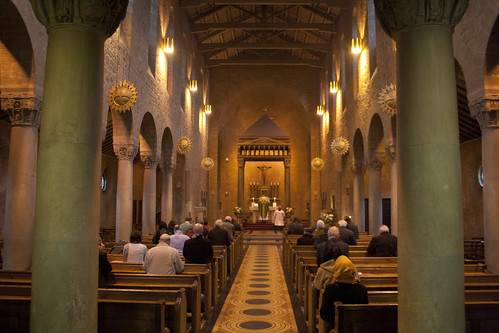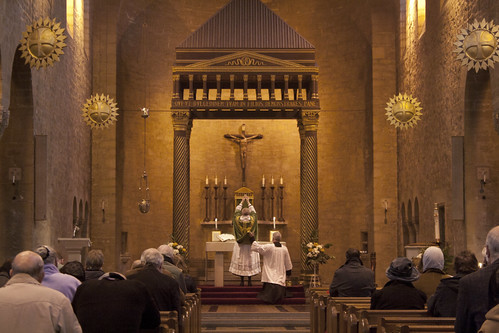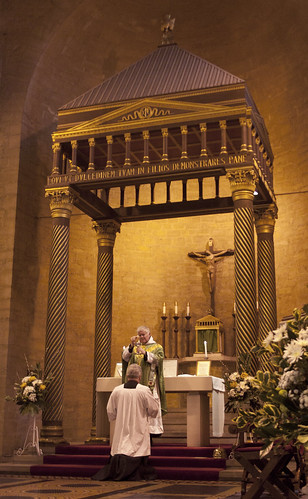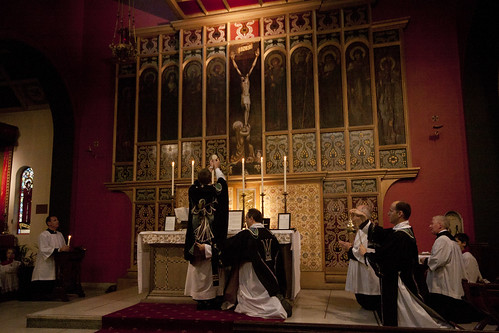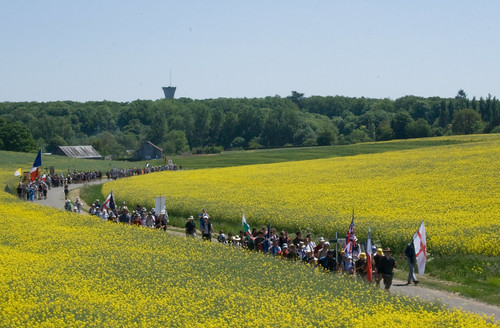Ht Paix Liturgique Newsletter [mailto:information@paixliturgique.org.uk]
5 Questions to Leo Darroch, President of Una Voce
5 Questions to Leo Darroch, President of Una Voce
Leo Darroch, who is the President of the International Federation Una Voce, has agreed to answer our questions about the recent presentation in Rome of his organization's third report on the implementation of the Apostolic Letter Summorum Pontificum. As a sign of complementarity between the oldest international organization caring for the TLM and our growing newsletter, Una Voce chose to join to its document the results of all the international surveys sponsored by Paix Liturgique.
1/ You are the President of the oldest organization supporting the TLM: could you give us a brief introduction to Una Voce and to its work?
Leo Darroch: Towards the end of the Second Vatican Council, there was growing concern among the laity for the continuity of the Church's liturgical heritage. As a result, in late 1964 and early 1965, a number of national associations were formed. Delegates from six European associations met in Rome early in 1965 and the International Federation Una Voce was formally erected in Zurich on January 8th, 1967 when delegates from 20 associations approved the draft statutes and elected the first Council.
The Federation is a lay movement, and its principal aims are to ensure that the Missale Romanum of Pope John XXIII (1962 edition) is maintained in the Church as one of the forms of liturgical celebration, and to safeguard and promote the use of Latin, Gregorian chant and sacred polyphony. It represents member associations in more than 30 countries. Since the promulgation of the motu proprio Summorum Pontificum in July 2007, requests for information and assistance have been received in increasing numbers from as far apart as Panama and Japan. A General Assembly is convened in Rome every two years and elections are held for the Council and Presidency. The Federation is not an organization run from above by a central committee. Each national association is an autonomous body that is encouraged to do all that it can to achieve the objectives of the Federation at the local level but the leadership of the International Federation is better placed to represent the common concerns of traditional Catholics world-wide at the highest level of Church government.
The Federation is recognized by the Holy See, its views are received with courtesy and respect by the relevant Roman Congregations, and its representatives are received by them in the same manner. Over the years it has made successful interventions with Rome on numerous occasions to safeguard the traditional Mass and ancient liturgical practice.
2/ What is your judgment on the implementation of the MP Summorum Pontificum since 2007? In your opening comments to your third annual report, you emphasise the clear opposition of a large part of the episcopate all over the world: can you elaborate on your findings?
LD: The motu proprio was welcomed with great joy by the members of the Federation and its work has increased remarkably since then. Many bishops have responded obediently to the motu proprio and this has resulted in great benefits for clergy and laity in their dioceses where parishes have been rejuvenated, especially in the USA. However, it is also true that a great many bishops have not responded to the plea from Pope Benedict XVI to “generously open [their] hearts and make room for everything that the faith itself allows.” Part 3 of our report provides details from member associations where bishops have ignored or refused legitimate requests even when priests have said that they would like to celebrate the usus antiquior for their people.
Although the Holy Father, the Supreme Legislator, has given permission directly to priests, it is a fact that many bishops seem unable to accept that Summorum Pontificum is an Apostolic Letter – a papal decree - and not an indult (eg. Ecclesia Dei adflicta - 1988) where their permission was required; they are refusing to accept the expressed will of a higher authority.
3/ Some people continue to think that the TLM is reserved to upper-class, old-fashioned Europeans: is that your experience? In the MP, the Pope states his hope that the reintroduction of Blessed Pope John XXIII's Missal will reach not only " traditionalists" but all Catholics: would you say that this aim has been accomplished?
LD: This argument is put forward by those who are ignorant of the work of the Federation or by those who wish to discredit our movement. Although the movement was started in the 1960s mainly by educated Europeans it was because they were best placed at the time to launch such a movement. Since then, the Federation has expanded to every corner of the world and most of the new groups being formed are from across the social spectrum – and with male and female leadership.
The description ‘traditionalist’ is often taken to mean someone who experienced the older form before the new Mass was introduced in 1970 but the Holy Father is absolutely correct in stating that young persons have “encountered the Mystery of the Most Holy Eucharist” and become attracted to it. Without exception, the new groups being formed are being organised and led by young people in their twenties and thirties. For example, I am currently dealing with enquiries from Indonesia, Kenya, Panama, and Japan. All these groups are being led by young people under the age of thirty-five. It is quite clear that the Holy Father, with his pastoral concern for the whole Church, is more in touch with the desires of the faithful and priests than many bishops who appear to have no knowledge, or interest, beyond the boundaries of their own dioceses. As more and more people are discovering the usus antiquior, the more enquiries are being received by lay faithful for advice and guidance on how to form Una Voce groups.
But it is not only the laity that is enthused by the resurgence of the traditional liturgy it is also the clergy and religious. The number of priestly societies and religious orders (both male and female) using the traditional Missal is growing year on year. And these are predominantly young. A list, perhaps not complete, is given on our website www.fiuv.org.
4/ A year after the reorganization of the PCED, a move long awaited by the faithful, can we say something has changed in Rome? Do you think it is the appropriate institution to ensure the fair and generous application of the MP?
LD: I would not say that the PCED was reorganised a year ago; I would say that the process of reorganisation was started, which is not quite the same. It is still ongoing. I think it is clear to everyone that the PCED is now much stronger than it has been since its inception which can only be a good thing. Its office space has recently been greatly enlarged so perhaps there will be an appropriate increase in staffing levels to deal with the expansion of work. From my observations, the signs are encouraging. Monsignor Pozzo is an excellent Secretary and administrator and, unlike before, the priests who have recently been appointed to work in the Commission all celebrate the traditional Mass on a daily basis and have an affinity with those laity, such as the members of the Una Voce Federation, who wish to worship Almighty God according to the liturgical books in force in 1962.
I do not think it is my place to comment on whether or not the PCED is the appropriate institution. This Commission was erected by Pope John Paul II and has now been placed in the Congregation for the Doctrine of the Faith by Pope Benedict XVI. The motu proprio concerns not only the liturgy, but also the bishops, the clergy, and the laity, so which Congregation or institution really would be appropriate?
5/ You were in Rome mid-November to present your report to various curial prelates: we know your 2009 report was most appreciated because of the documents and photos it contained about the training sessions for priests, can you give us a feedback on how this third report has been received?
LD: During the six days I was in Rome with Jason King, Vice President, and Rodolfo Vargas Rubio, Secretary, we had meetings in the Congregations for Divine Worship, for the Clergy, for Bishops, for Catholic Education, in the Apostolic Signatura, in the Secretariat of State, and two meetings in the PCED. We were also fortunate to receive invitations from Cardinal Burke to a reception in the North American College immediately after the Consistory of 20th November, and the next evening at his office in the Palazzo della Cancelleria. Copies of our report were presented in all these dicasteries and were very well received. Although the report is intended primarily for the Holy Father and the PCED it also contains information that is pertinent to all these dicasteries. It is not the practice of the Federation to reveal the private conversations in Rome but the response to our report was welcoming.
- Posted using BlogPress from my iPhone
 The Sons now have a new website
The Sons now have a new website




